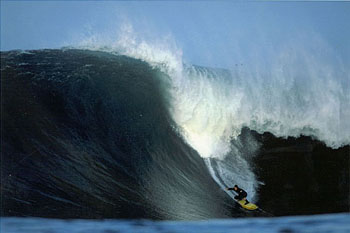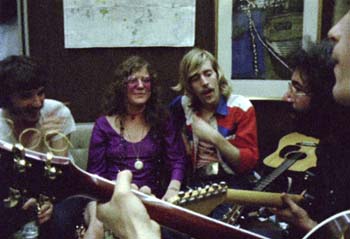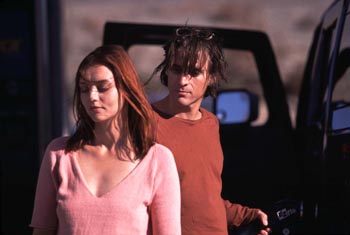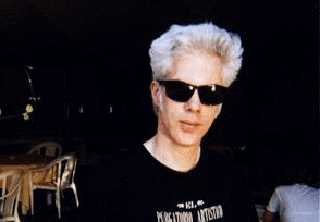I'm sure it'll be obvious why I didn't use most of these
tangential, film-geeky tidbits from my April 15th conversation with
Jim Jarmusch in the final
article,
but I think they're kind of cool, anyway.
Coffee & Cigarettes
Echoes, dubious relations, Blue in the Face, looking back
vs. going forward, and Chantal Akerman.
Robert Davis: So from what I understand Coffee &
Cigarettes was shot over a long period of time... in order to
capture the natural aging process —
Jim Jarmusch: [laughs] Yeah.
R: — of Tom Waits and Iggy Pop.
J: Yes, exactly my intention.
R: Actually it's surprising to me how rich the themes are given how it was made and how, you know, you didn't start with these ideas necessarily, but they do resonate.
J: Well, yeah, it's just an organic thing, kinda. It just starts growing and you try to pay a little attention to which way it's leaning.
R: "Twins," the one with Steve Buscemi and the Lee "twins" — that short predates the White Stripes, I'm sure.
R: And yet it sort of echoes this joke in the media about the White Stripes—
J: Are they brother and sister?
R: Yeah, it's implied in this weird way, in this other short that existed before the band.
J: Yeah, and in the script for Meg & Jack, you know, we take the tack that they are brother and sister, in a way. Cause it's like, "Remember when we were little and you had the Barbie thing." And he says, "Are you going bowling tomorrow night?" You know. Yeah. And then the cousins—
R: Are Alfred Molina and Steve Coogan cousins, or not?
J: Right. And GZA and RZA are cousins, too, so there's that,
and the cousins and the cousins [Cate Blanchett and fictional cousin
Shelly].
R: That's neat how those things recur. The opening one with Steven Wright and Roberto Benigni — they switch seats, and they also switch places at the dentist. It's a gag, and it's funny, but it does sort of blossom into this thing later where people are mistaken for each other or they switch places.
R: I think it shows up after you've seen a bunch of them.
J: Yeah, I never really thought of that, even, the switching and that resonating.
Shelly says she got into a bar when they thought she was Cate. The Lee
siblings confuse their clothes ("get your own style!"). Bill Murray is
posing as a waiter ("just don't tell anybody"). Somewhat related is the
recurring one-up-manship: Molina
and Coogan over star power, Cate and Shelly over class differences,
and Waits and Iggy Pop over the jukebox and the drummer.
R: Elvis and his evil twin switch places.
R: [At the festival screening] you said that you felt like you finally had enough songs for a record album. The movie does feel like a mix tape in a way, and your conversation with Harvey Keitel in Blue in the Face could almost be a bonus track on this album. You've been thinking about cigarettes for a long time.
J: Yeah, although that wasn't my idea, you know, that was Paul
Auster's. But he gave me some subjects, some ideas, and I made some
more. Then I went in and Harvey was like, "Hey I'm half asleep today,
man. I hope you got something, cause I got nothin'." I was like, uh
oh, and I wrote a list and I made them put it right outside the camera
so I could have a list of subjects to ramble on about.
R: I don't remember all of the details, but I know that every time I see a Nazi smoking a cigarette — which isn't that often, actually — I think of how you mention that they hold them in that funny way.
J: Yeah, and I still am obsessed with people throwing guns away. Like they run out of ammo and they throw the gun away — wha? wha? — that still astounds me.
R: Was it Top Secret or one of the Naked Gun movies where they start throwing the guns at each other?
J: Yeah. [laughs] It was one of those Naked Guns.
R: It's cool that [Coffee & Cigarettes is] kind of a trip through your body of work. It has familiar faces from the past, and familiar locations, like Memphis, and I like that, because I like revisiting your movies, I guess, but I wondered — I read somewhere that you don't like to look back at your movies.
R: But this project sort of requires it, at least in little
snippets. Did you see new things when you went back to look at the
shorts?
J: I don't know if I saw new things, but when you put them
together it becomes a new whole thing, with the echoes, so that
allowed me not to have that stigma for myself. Instead it was like... I'm
going forward by constructing something out of elements, some of which
were filmed a long time ago. So it wasn't so painful in that way for
me. It was kind of fun, actually, to see how they interrelated.
R: I don't know if you've seen this thing that Chantal Akerman did. It was for a French TV show, just an hour. She was supposed to do a portrait of herself, and instead of doing that she took clips from her movies and just assembled them.
R: And they were — yeah — it's kind of mysterious because it's not clear what a given clip says about her, but she feels it says something about her. There's no commentary about any of them, you just see a series of clips. It seems like Coffee & Cigarettes may not be personal in that way, but it's still a cool summation of sorts.
J: Yeah, wow that's a beautiful idea. She always has some
really beautiful ideas. Do you know a film she made called Toute
une nuit? It all takes place in one night and keeps jumping among
different characters and back around. It's really a beautiful
film. It's one of my favorites of hers. She's pretty amazing.
World Cinema, Take 1
Film festivals, region-free DVD players, Chaplin's A King in
New York, and a Chaplinesque moment in Dead Man?
J: Are you covering a lot of stuff from the festival?
R: Well, I'm seeing a lot of stuff, so I'm looking forward to that. I'll probably only write about some of it.
J: It's quite a good program.
R: Yeah. Are you gonna get to see much or any of it?
J: No, I usually don't at festivals, you know, any more. I get
kind of burned out and then I want to kind of distance myself a little
and go off and check out other things. I do see films at festivals but
not as many as I would like to. I'd like to go to some when I don't
have a film there, you know, and just be there for the films, but...
R: Yeah. Well it's unfortunate that in most places you can't see these movies anywhere else [but a festival].
R: And so you end up packing them into two weeks, but if you had the opportunity you'd spread them out.
J: Yeah, it can be rough, seeing like 3 a day, and stuff.
R: But I really feel like there's pressure building on the wall around the American multiplex. I mean Paste [the magazine for whom the interview was conducted] is out there looking for signs of life, and DVD distributors are figuring out that there's interest in things like Tokyo Story, and the Internet has all this information. Do you think that's true?
J: Yeah, I love the idea. I mean, I have an "illegal" multi-system DVD player and it's so great, man, you can buy them anywhere. I get all regions.
I meant to ask about how the "wall around the American multiplex" affected
him as a filmmaker of such independence, but I think it's telling how
quickly Jarmusch views the topic through the eyes of a film-watcher.
It's always surprising to me how few filmmakers actually seem to love
cinema. Jarmusch is obviously an exception.
R: You can place the order over the Internet and it takes just a few days longer to get it from, like, France.
J: I know. I just ordered the box set of Feuillade's Fantômas from France. It's a beautiful set. A friend of mine had it and I saw it. It's really cool. I can't wait till I get it.
R: Does that include Les Vampires? Or that was already on DVD?
J: No that's a separate box that came out, wow, maybe four years ago. I have that actually on videotape not on DVD.
R: Speaking of box sets, this Chaplin box set that MK2 put together recently — I saw your comments on A King in New York. Did you choose that movie to comment on?
R: That's an interesting choice.
J: They first wanted me to do Modern Times, which seems so obvious and really is his great film, probably. But I just thought it was an overlooked film that kind of resonated with the world now. But, you know, it has some really great things in it. It's not a masterpiece of cinema, but it's a pretty fascinating artifact and an interesting film. I mean, I'm a Keaton fan, myself. I have the Keaton box set. Oh man, that's very precious to me. But I did it because I thought that film is kind of overlooked.
R: Yeah, it's gotta be his least remembered movie, of the ones he starred in.
J: But it has some incredible insights into commercial American culture, you know? Even rock-and-roll. It's quite amazing. And I love it when he hoses down the House Un-American Activities Committee. That's really good. [laughs]
J: Or that thing in the restaurant, where he's doing — he wants a lobster and he does all these pantomimes —
R: A turtle or something.
J: Yeah, turtle soup! Oh that's great. He always comes up with some incredible shit.




